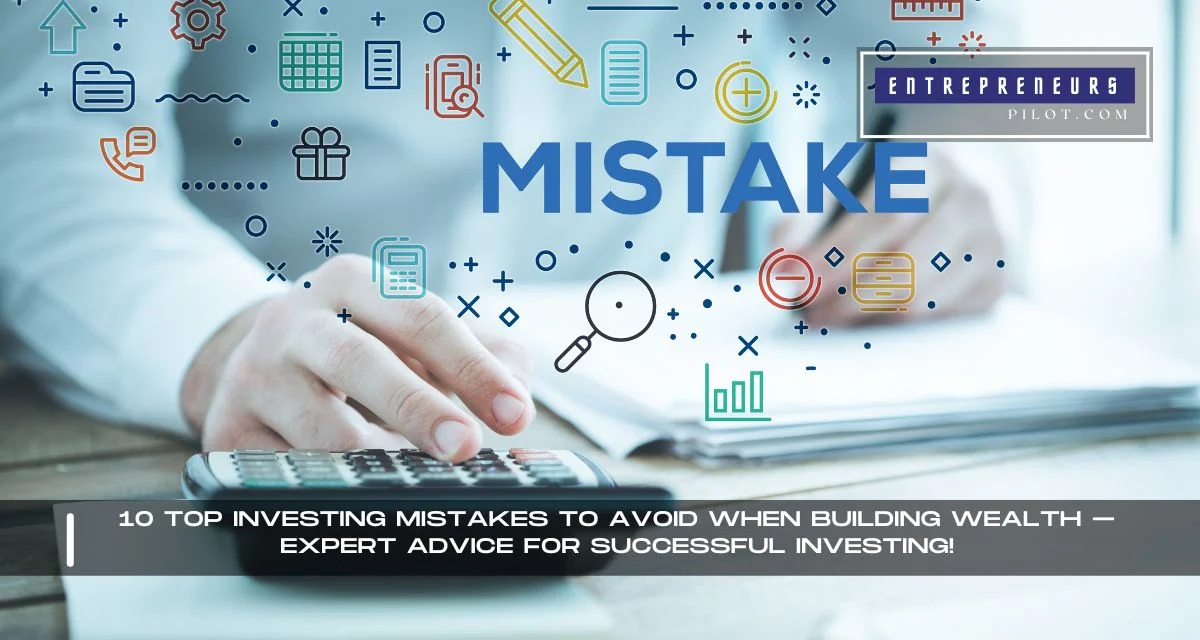Investing can be a powerful tool for building wealth, but it’s riddled with pitfalls that can derail even the savviest investors. To guide you on a path to successful investing, we’ve compiled 10 Top Investing Mistakes to Avoid When Building Wealth. This insightful guide, peppered with expert advice, aims to steer you clear of common errors that can impede your financial progress.
From overconfidence in market predictions to neglecting diversification, understanding these mistakes is crucial. Whether you’re a novice or a seasoned investor, this post will enhance your investing acumen, helping you avoid costly blunders and maximize your wealth-building potential.
Table of Contents
1. Ignoring the Power of Compound Interest
One of the biggest mistakes is underestimating compound interest’s impact. This phenomenon can turn modest savings into substantial sums over time. Start investing early to leverage this powerful wealth-building tool fully.
2. Lack of a Clear Investment Strategy
Diving into investments without a solid plan is like navigating a ship without a compass. Define your financial goals, risk tolerance, and investment timeline to create a strategy that aligns with your objectives.
- For Expert Financial Insights And Guidance, You Can Visit Our Sister Site – ArabsGeek.com Now!
- Curiosity Piqued? Dive Into the Most Captivating Financial Content by Visiting Our Homepage!
- Unlock Exclusive Business Opportunities! 🚀 Connect with Us Now at our Email: [email protected]!
3. Overlooking Diversification
Putting all your eggs in one basket can be risky. Diversify your portfolio across different asset classes, industries, and geographical locations to mitigate risk and balance potential losses with gains.
4. Chasing Hot Tips and Trends
Following the herd or jumping on the latest investment trend often leads to disappointment. Base your investment decisions on solid research and long-term potential rather than fleeting market fads.
5. Reacting Emotionally to Market Volatility
The market’s ups and downs can provoke emotional responses, leading to rash decisions. Maintain a long-term perspective and resist the urge to react impulsively to short-term market fluctuations.
6. Neglecting to Regularly Review and Adjust Your Portfolio
Your financial situation and goals can change over time, and so should your investment portfolio. Regularly review and adjust your investments to ensure they remain aligned with your current goals and market conditions.
7. Underestimating the Impact of Fees
High investment fees can eat into your returns. Pay attention to expense ratios, transaction fees, and other charges associated with your investments. Opt for low-cost options that don’t compromise on quality.
8. Failing to Learn from Mistakes and Successes
Both successes and failures provide valuable learning opportunities. Reflect on your investment decisions, understand what worked or didn’t, and use these insights to refine your strategy.
9. Disregarding the Importance of Tax Efficiency
Taxes can significantly impact your investment returns. Consider the tax implications of your investment choices and utilize tax-efficient strategies like retirement accounts or tax-loss harvesting.
10. Not Seeking Professional Advice When Needed
While self-investing can be rewarding, don’t hesitate to seek professional advice, especially in complex situations. A financial advisor can provide personalized guidance based on your unique circumstances.
Conclusion
Building wealth through investing is a journey filled with learning and adaptation. By avoiding these common mistakes and applying a thoughtful, disciplined approach, you can significantly enhance your chances of investment success. Remember, investing is not just about growing your wealth; it’s about making informed decisions that align with your financial goals and risk tolerance.
Frequently Asked Questions
Q1: How much money do I need to start investing?
A: You can start with any amount, thanks to various platforms catering to different investment sizes. The key is to begin and consistently contribute.
Q2: Should I invest if I have debt?
A: This depends on the interest rate of your debt compared to the potential return on your investments. Prioritize high-interest debt, but don’t neglect investing completely.
Q3: How often should I check my investments?
A: While it’s important to stay informed, obsessively checking can lead to overreacting. A quarterly or semi-annual review is generally sufficient for most long-term investors.
Q4: Can I invest successfully without a financial advisor?
A: Yes, many investors successfully manage their portfolios. However, seeking professional advice can be beneficial, especially for complex financial situations.
Q5: How do I know if my portfolio is diversified enough?
A: A diversified portfolio typically includes a mix of stocks, bonds, and other assets across various industries and geographies. A financial advisor can help assess if your portfolio is diversified effectively.











